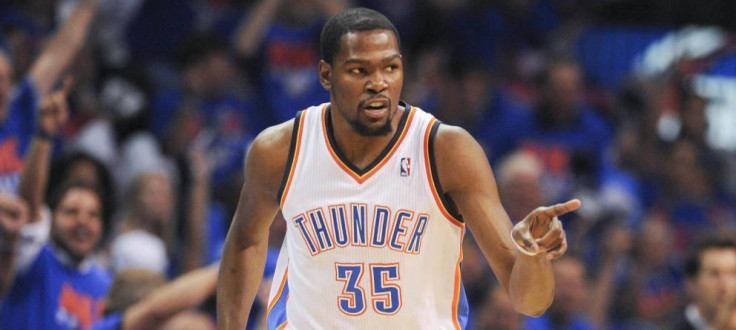Kevin Durant Shoe Deal: Why Did Nike Match Under Armour’s Contract Offer?

Kevin Durant has decided to stay with Nike (NYSE: NKE), after it looked like the company could lose one of its top athletes to a burgeoning competitor. While the Oklahoma City Thunder star was reportedly offered between $265 million and $285 million by Under Armour (NYSE: UA), Durant has re-signed with Nike.
According to ESPN, Durant’s new 10-year deal could net him up to $300 million, depending on how well his shoes sell. He first signed with Nike when he entered the NBA in 2007 for $60 million, and the deal expired on Sunday.
When Durant’s new contract with Nike comes to an end, he will have been with the brand for 17 years. However, the 25-year-old came close to leaving the sports apparel giant. Nike reportedly first offered Durant around $20 million a year, which was significantly less than what Under Armour was willing to pay. Meanwhile, Under Armour reportedly offered Durant "stock and other incentives, such a community center built in his mother's name," according to ESPN's Darren Rovell.
Why did Nike cave and increase its offer to Durant?
Size seems to matter when it comes to shoe contracts. The Beaverton, Oregon-based company stands alone when it comes to sneaker companies, with a market cap of over $68 billion. According to the Baltimore Business Journal, Nike and Brand Jordan, which is owned by Nike, make up approximately 93 percent of the sneaker market share. Under Armour doesn’t come close, claiming just a 0.35 percent share of the basketball shoe market.
While Durant is a top star, losing him wouldn’t change the fact that Nike is in business with most NBA players. Nike and Jordan Brand are endorsed by 322 NBA players, ranking well ahead of Under Armour’s 13 players, according to HoopsHype.
If Under Armour had been trying to sign almost any other player, Nike might have been more apt to let him go. However, losing the second-best player in the NBA to a company on the rise might not have been best for business. It also would have been a blow to the brand's image.
Even if Durant isn’t worth what Nike is paying him, losing the All-Star would have been a boost to competitor Under Armour, making the Baltimore-based company a much more legitimate competitor. Under Armour, which has a market cap of roughly $15 billion, saw sales increase by 25 percent in 2013, and the growth has continued in 2014, according to Forbes. Adding the reigning league MVP, who also happens to have grown up near Baltimore, would make Under Armour even more attractive to other NBA players looking for a new deal.
Under Armour doesn’t share the brand equity of Nike, but it’s becoming increasingly popular among younger players. Brandon Jennings signed with Under Armour on his 19th birthday, while Kemba Walker signed at age 21. Under Armour landed its biggest star before the start of the 2013-2014 season in Stephen Curry. Adding Durant alongside Curry would have given Under Armour two of the 10 best players in the league. Even by not landing Durant, Under Armour has gained traction in the sports apparel world by the buzz of going head-to-head with Nike.
Had Nike not increased its offer, there’s a good chance Durant would have signed with Under Armour. However, Durant has always favored his current brand. According to USA Today’s Jeff Zillgitt, Durant turned down a more lucrative offer in 2007 to sign with Nike.
Durant’s decision to stay with Nike is certainly an important one. After winning the MVP award and his fourth scoring title, he continues to be one of the most popular American athletes. By retaining Durant, Nike furthers its dominance in the basketball shoe world.
A spokesman for Nike was unavailable to comment on the deal.
© Copyright IBTimes 2024. All rights reserved.






















